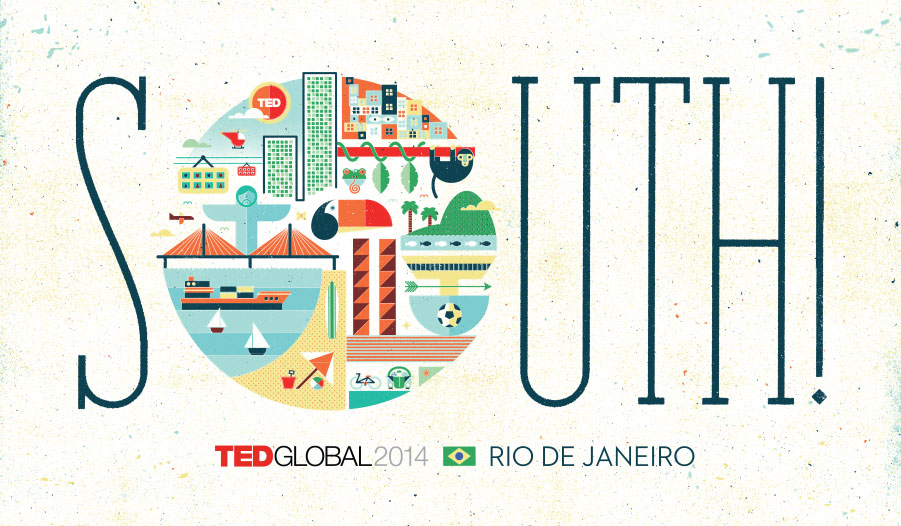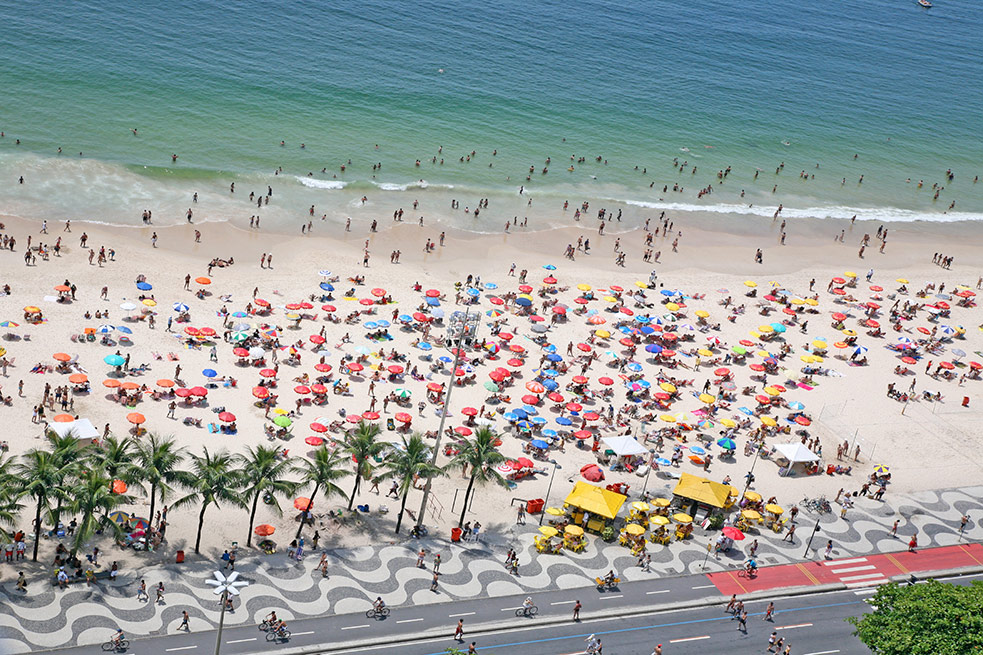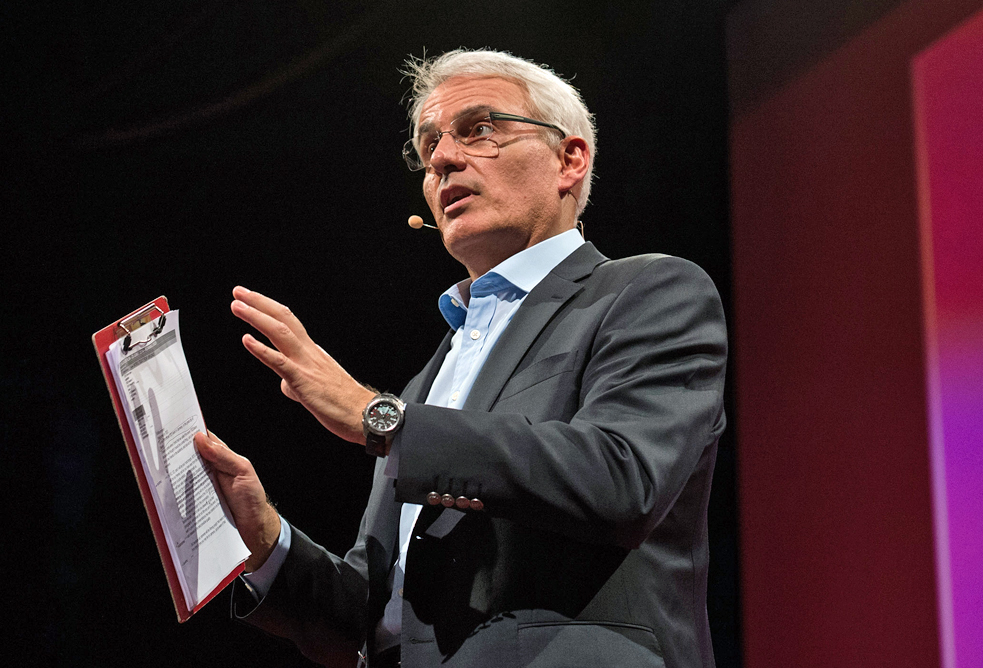 TEDGlobal 2014 will be held in Rio de Janeiro from October 5 through 10. With a speaker program that ranges from a nomadic filmmaker to a Buddhist monk, from a technologist changing the way we detect cancer to a chef who’s preserving the culinary heritage of Brazil, the conference promises to flip our thinking many times over. We spoke to curator Bruno Giussani about the themes emerging in the program, the speakers he can’t wait to see take the stage. Below, an edited transcript of our conversation.
TEDGlobal 2014 will be held in Rio de Janeiro from October 5 through 10. With a speaker program that ranges from a nomadic filmmaker to a Buddhist monk, from a technologist changing the way we detect cancer to a chef who’s preserving the culinary heritage of Brazil, the conference promises to flip our thinking many times over. We spoke to curator Bruno Giussani about the themes emerging in the program, the speakers he can’t wait to see take the stage. Below, an edited transcript of our conversation.
How did the theme “South!” emerge?
Every TED conference has a different theme, and we choose the theme based on our reading of current big trends. Of course, we choose them in a way that’s at the same time specific enough to provide an organizing principle for the program, but is also open enough to include very different and eclectic kind of topics. It is an interesting balance to seek: You want to be able to, throughout the week, deploy a lot of different topics and approaches, but at the same time, give coherence to the program and create a meta-narrative on top of the individual talks and sessions.
We are going to South America for the first time. The global South is clearly not only an emerging part of the world—it’s already having significant impact on pretty much every field, from politics and the economy to architecture and creativity. So we decided to call it “South!”. With an exclamation mark, to underscores that the global South is not just emerging—it’s a reality. It’s not somewhere in the future, it’s now.
What made Rio the right location for TEDGlobal 2014?
We wanted to go to South America because it’s one of the regions of the world where we’ve never had an official TED event, but where TEDx and the Open Translation Project and TED.com are really taking off in a significant way. There’s an engaged local and national TED community in every major country in South America. So it felt like—of course we want to go to South America.
We went and visited several cities—not only in Brazil, but in other countries too. We looked at many different options—big cities, small cities, capital cities, far-off cities. We got a lot of help from a lot of people—particularly the local TEDx teams, which I want to thank. They played a very important role in helping us understand the reality on the ground, and in connecting us with relevant people and organizations.
In the end, Rio turned out to be not only a very attractive city, but also a vibrant hub of creativity and innovation. Plus, it has a mayor who is a big fan of TED and who spoke at TED three years ago. (Watch Eduardo Paes’ talk, “The four commandments of cities.”) So we decided that Rio would be the place for TEDGlobal 2014.

TEDGlobal 2014 will be held at the Copacabana Palace Hotel, located on gorgeous Copacabana Beach. Photo: iStock
Who are some of the speakers on the program that people might not know about, but will be totally fascinated by?
For a curator it is always difficult to single out one speaker over another. I’m excited by all of them—they represent such a broad spectrum of ideas, backgrounds and geographies. If you really want, I will give you three names that represent three different directions in which the program will be going. But I could have mentioned any of the 40 speakers.
José Padilha is a Brazilian filmmaker. His most recent movie, actually, was a big Hollywood franchise—he directed the new RoboCop. But that won’t be the content of his talk. Previously, he directed possibly the most significant movie about violence in Brazil: Elite Squad—or Tropa de Elite. Itcame out a few years ago, and it was about a squad of Brazilian police officers confronted with gangs in the favelas. It really hit a nerve in the political debate in Brazil. Besides, José is just a fantastic storyteller.
Then there’s Khalida Brohi, from Pakistan. She’s a young activist, and she has an incredible story. She was confronted in her close circle of family and friends with the practice of honor killings in the tribal regions of the country and she wanted to do something about it, so she started talking about it with the media. She was shunned by people in her village, as was her family. She realized that, in her activism, she was calling a practice wrong without looking at the values underlying it—which were actually very meaningful to people. So she went back to the village, sat down with the elders, and apologized. She asked them: what can we do together? What they came up with was the idea of creating an embroidery school for young women. We hear that and say, “That’s it?,” but it was actually quite groundbreaking. This is a region where young women are not allowed to gather alone or even leave the house without being accompanied, and she got permission from the elderly of her village for gathering them daily at a school. There’s so much more to Khalida’s story that I don’t want to give away, but what’s happened since has been incredible. Let’s just say she has found a very creative, innovative way for women’s empowerment. It’s a story of how slow-motion activism can achieve real results.
I think people will also be fascinated by Kimberley Motley, an American lawyer who is the only foreign litigator in Afghanistan. Basically, she defends foreigners who are in prison in Afghanistan for drugs, smuggling, whatever reason—and she also defends Afghan women in Afghani courts, with an astonishing rate of success. These are two groups that didn’t really get legal representation before she came into the picture. Hers is an interesting story about working within a legal system where you have to create legal protections through court cases. She’s basically building up a legal framework, case by case. She’s an incredibly courageous woman.
TEDGlobal is a global conference, but I assume you’ve paid special attention to South America?
Absolutely. We will have speakers from all across the globe, mostly from the global South. But because we are in South America for the first time, a number of the talks will be from Brazilian and South American speakers. So many different topics: we have education innovators, a chief from an Amazonian tribe, artists from the favelas, scientists, technologists, activists, historians. We’ve tried to invite a diversity of voices from all across the continent.
One name?
If you insist, I will mention Tasso Azevedo. He is a forest conservationist, and the man who can most be credited, together with his colleagues, with developing and pushing policies that have drastically reduced deforestation of the Amazon by 80%. Deforestation still happens, but it’s down from the peak. He’s very well-known in Brazil, and little-known outside of Brazil. But he’s done an astonishing service for all of us.
And a few names on the speaker list are very familiar. Tell us about some of those people.
The best-known speaker is probably Glenn Greenwald, the journalist who did the most to let the world know about the surveillance revealed by Edward Snowden. He just published a book, No Place to Hide. We’re still discussing his talk, but it will be about surveillance and privacy.
Miguel Nicolelis, well, if you haven’t heard of him before, you have certainly heard of him now. He’s the neuroscientist who led the team that created the brain-controlled exoskeleton that allowed a paraplegic young man to kick off the World Cup.
And then there is Vik Muniz, the Brazilian artist, who gave another TED Talk several years ago.
There are also superstars in their own field, like Wendy Freedman, the astronomer. She’s going to talk about building the Giant Magellan Telescope in Chile. Have you noticed how most of the big astronomy telescopes are being built in the South? The South is the future of astronomy.
And we will also have a few other people whose names will be immediately recognizable.

Bruno Giussani shares some highlights of the TEDGlobal 2014 speaker program, and themes emerging as the event comes together. Photo: James Duncan Davidson
What are some unexpected themes and connections that you see emerging as the program comes together?
There’s a lot around the idea of South/South. From the North, we tend to look at things as a game of North/South or South/North. The North sends technology, ideas and aid money to the South, and the South sends back agricultural or industrial products (or squanders the money because of corrupt governance systems). That’s an obsolete way of looking at the world. The North/South thing is of course still there, very much so, but there’s also an incredibly powerful South/South dynamic. South/South trade is exploding, and South/South investment, learning, and idea-sharing are growing very fast. Ideas that are generated in Africa are developed in Brazil; technologies that are developed in China are used in Africa. A lot of the most interesting thinking around the impact of social networks in our life, for example, is being done in the South by young people with sociology, science, philosophy, economic and political backgrounds who observe things through a completely different lens than the lens we use in the North. They’re coming up with very interesting ways of looking at things.
When do rehearsals start for TEDGlobal talks?
We’re already working with some speakers—many of them have already sent in drafts of their talks. We’ll work with everyone over the next four months. Then we’ll bring them to Rio two days before the event for a final rehearsal on the stage. The final rehearsal is only partially for the speaker—they’re already ready at that point, so it is more for the people working around them, the cameramen, the light and audio technicians, and so on.
Speaking of the stage, tell us a little about what to expect from the theater.
The conference is taking place at the Copacabana Palace Hotel, which is one of the oldest and most interesting hotels on Copacabana Beach. The core of the conference will be at the hotel. But the hotel has only so much capacity, and so to complement the capacity, we are building an annex on the beach just in front of the hotel which will host the main speaker program. It will be a closed theater, of course. But from the annex, you’ll be able to walk straight to the beach. We’re scheduling the program and designing the spaces to give people time to socialize and to enjoy the beauty of Rio as well as attend the whole program. I mean, we will be on one of the most beautiful beaches in the world—in the middle of one of the most beautiful cities in the world. It will be a great event.
Interested in watching the TEDGlobal program? Apply to attend or get TED Live »
Comments (5)